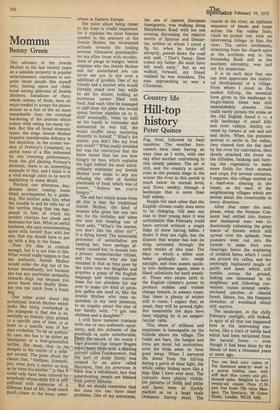Momma
Benny Green
The advance of the Jewish Mother in the last twenty years as a saleable property in popular entertainment, continues to surprise those people like myself who, having spent our childhood among platoons of Jewish Mothers, battalions of them, whole armies of them, have always tended to accept the phenomenon as a fact of life no more remarkable than the eventual hardening of the arteries which comes with eating too many latkes. But like all broad dramatic types, the stage Jewish Mother requires considerable delicacy in the depiction. In the screen version of Portnoy's Complaint, an awful mess of a film redeemed by one towering performance, from the girl playing Portnoy's mistress, there is an interesting example of this, and I think it is a vital enough point to be worth explaining in some detail.
Portnoy one afternoon daydreams about coming home blind, accompanied by a guidedog. His mother asks him what the trouble is and he tells her of the terrible thing that has happened to him, at which his mother clutches her cheek and bemoans her fate. What an awful business, she says commiserating more with herself than with her son, that she should have to put up with a dog in the house.
Now the idea is comical enough, but it is not true to life. What would really happen is that the authentic Jewish Mother would order the dog out of the house immediately, not because she has any particular antipathy towards dogs, but because you never know what deadly diseases you can catch from a lousy dog.
One other point about the archetypal Jewish Mother which looks like being overlooked in the stampede is that she is essentially an historic type, pinned to a specific area of time, or at least to a specific area of her own evolution. To be an authentic case, she has to be either an immigrant or a first-generation settler. She must, that is, be Steeped in the mores of a peas ant society. The point about the classic line, " Oedipus, Schmedipus, what does it matter as long as he loves his mother,", is that it could only have been uttered by somebody whose daily life is still suffused with memories of a different kind of life, lived much much closer to the bone, some where in Eastern Europe.
The point about being closer to the bone is vitally important, for it explains the most famous symbol in the armoury of the Jewish Mother, her reverential attitude towards the feeding process. Obsessive gourmandisers are often those with recollections of pangs of hunger, which explains why the Jewish Mother and her assimilated son can never see eye to eye over a tableload of goodies. One of my friends had a mother who would literally stand over him while he ate his dinner, holding an enormous tureen filled with food. And each time he managed to half-clear his plate she would spoon further supplies on to it, until eventually, when he held up his hands in surrender and announced he was full, she would shuffle away muttering absently to herself, "What's the matter, you don't like my food any more?" What really troubled her was the conviction that she knew better than her son how hungry he was, which explains the logic behind the most extraordinary statement any Jewish Mother ever made to any son refusing the offer of further plateloads of food, which was of course, "Believe me, you're hungry."
The sad fact which arises from all this is that the traditional Jewish Mother, the kind of woman who gives her son two ties for his birthday and when she sees him wearing one of them asks, "What's the matter, you don't like the other tie)" is a dying breed. The inexorable processes of assimilation are causing her, have perhaps al ready caused her, to mutate into a prosaic, unspectacular citizen, and the reason why she has mutated is that as time goes by she turns into her daughter and acquires a grasp of the English language and western conventions far too absolute for her ever to make the kind of price less gaffes she used to, like the Jewish Mother who once responded, in my very presence, to an inquiry about the size of her family with, "I got two children and a daughter."
I still have tenuous contacts with one or two authentic speci mens, and the richness of the smalltalk is quite unbelievable. From the mouth of the oracle I have learned that Ginger Rogers • made many films with a dancing partner called Frankenstein, that the 'part of Andy Hardy was created by an actor called Macaroni, that An American in Paris was a whodunnit, and that -,good-looking people. are blessed "t)vith pretty fixtures.
But we should remember that the sons too can have their problems. One of my associates, the son of eastern European immigrants, was walking along Marylebone Road with me one evening discussing the relative merits of Spinoza and Descartes, neither of whom I cared a fig for, when he broke off abruptly, peered down the road and said, "That's funny. Here comes my father. He must have left work early." But as we walked forward, my friend realised he was mistaken. The man approaching us was a Chinaman.


































 Previous page
Previous page